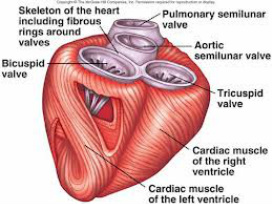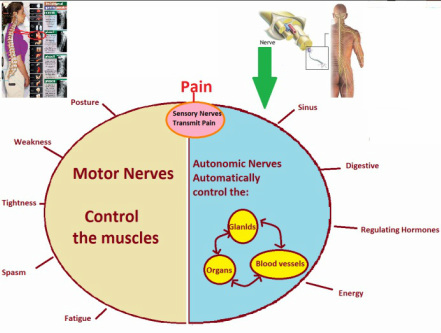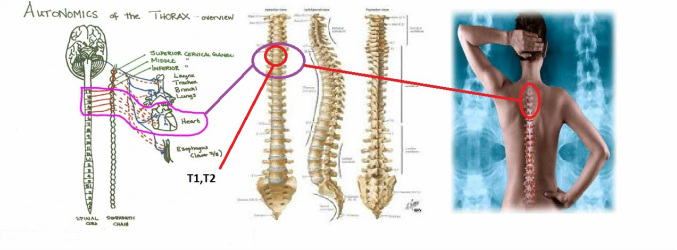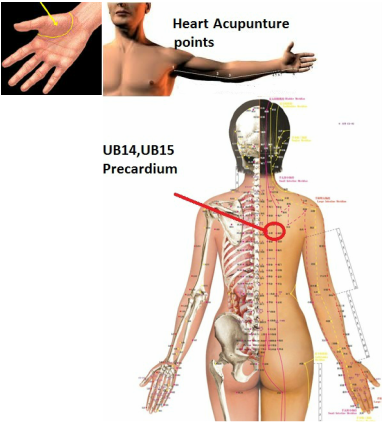 Heart Muscles (Fig 1) Heart Muscles (Fig 1) Most of us understand that when we have a pinched nerve it either comes from our neck or our low back and it can cause muscle spasms or muscle atrophy in our neck or back. In other words, when we wake up stiff-necked or experience a stiff back in the morning, we instinctively know that the nerve that is being pinched caused our muscle spasm or stiff neck. Most of my patients, when they come to my office, assert that they have a pinched nerve and they state with certainty that that is what is causing their stiffness.However, when it comes to wellness care, our patients have a bit of difficulty internalizing the correlation between a pinched nerve and the heart (Fig 1) . The muscles in our neck and low back, once in while, have a chance to relax. The heart muscle works non-stop. Unlike the muscles of the low back, pain is not the measurement to assess the health of the heart. The best way to assess the health of the heart is to look first at the nerves that relate to the heart and assess their function. In order to understand this, we need to explain a bit about the nerves themselves. Feeling vs. Function (Fig 2) There are three parts to the nervous system 1. Motor Nerves (control muscles) 2. Autonomic Nerves (control blood vessels, organs and glands) 3. Sensory Nerves (transmit pain) Notice on the graph below that the sensory part, which transmits pain, is only a small portion of the central nervous system. Nerve root compression can exist even when you don't feel pain.  The nervous system, the most complex organ system of the human body, governs everything from the basic functions like digestion and respiration to cognitive functions like memory and intelligence and muscles and controls just about everything you do, even when you're asleep. Nerve root compression can exist even when you don't feel pain (FIG 1) Nerve function is 90% organ coordination and organ function and only 10% sensory. Out of that 10% only 5% is pain sensory. So pain is a poor indicator of the quality of the function of the nerve; knowing this, the best way to find out if there is a pinched nerve or interference at the spinal level of T1,2,3 and T4 ( Fig 2) is by looking at the lung and heart functions; in chiropractic we call that cardiopulmonary function. 50% of the older population dies of heart related problems which can be prevented with early wellness care. A heart problem is a gradually developing condition which the spine will reveal early. Ti - Heart Symptoms: (Group Four, Symptom Survey Form) Structural:, left shoulder pain, recurring Ti subluxation Functional: epigastric distress, difficulty swallowing, apprehensiveness Signs: Ti transverse process nodulated and tender to palpation (Fig2) and acupuncture points (Fig 3) -left thenar pad tender when firmly squeezed (Fig 3) This patient may be a candidate for extensive nutritional support based or evaluation by a cardiologist .What do we suggest? Chiropractic adjustments accompanied with Acupuncture Nutrition: Card b-Plus 3, 3 times per day with meals for 1 year, or until signs resolve, then 3 per day thereafter Myo-plus is exactly the same product as Cardio-plus. You may use Myo-plus for more information Please call us 818-831-0100 T2 - Myocardium These patients have impaired nerve conductivity due to a lack of natural, non- synthetic vitamin B. This results in a lack of muscle tone throughout the body, most critically in the hardest working muscle, the heart. Symptoms: (Group Four, Symptom Survey Form) Structural: -spinal pain involving many areas, recurring T2 nerve interference caused by spinal misalignment (subluxation)(Fig2) Functional: -asthma, bronchitis, difficulty breathing, fatigue, fluid retention Signs: T2 transverse process nodulated and tender to palpation, low blood pressure, swollen ankles, swollen eyelids, B deficiency What do we suggest? Chiropractic adjustments accompanied with Acupuncture Nutrition: Vasculin 3, 3 times per day with meals for 1 year or until signs resolve,3 per day.thereafter for more information please call us 818-831-0100 These patients must avoid sugar, refined carbohydrates, and synthetic B vitamin products (specifically avoid products containing Thiamine hydro-chloride or Thiamine mono-nitrate). Click on the Like button below
0 Comments
Leave a Reply. |
New Patient SpecialArchives
July 2024
Categories |


 RSS Feed
RSS Feed
